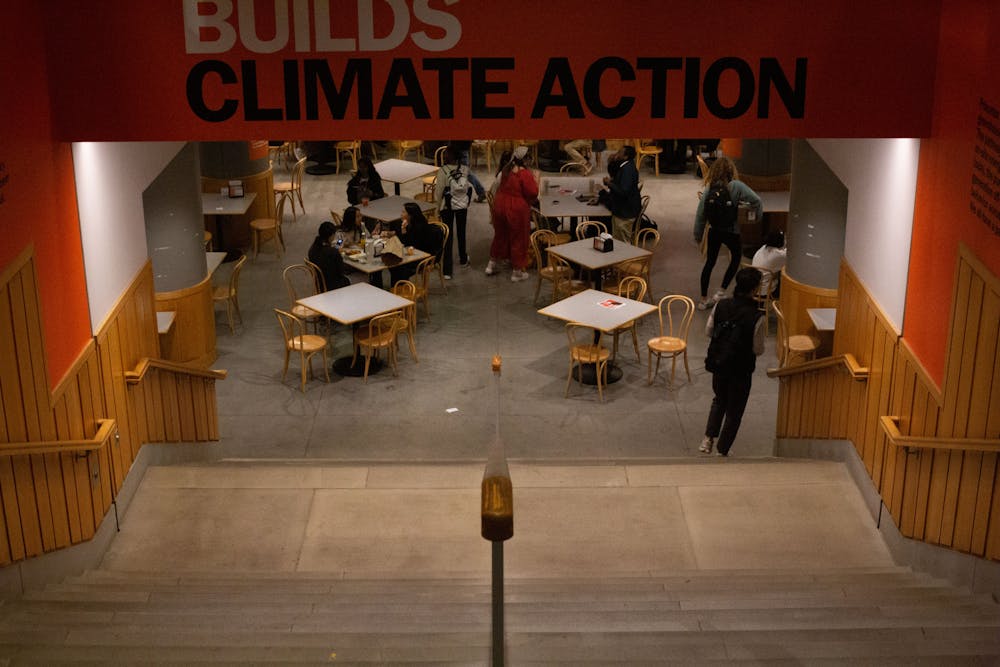The University’s construction efforts are tearing the whole campus up, and for good reason. To quote the title of an article by my colleague Alex Norbrook, “For climate, we need construction everywhere, all at once” — green construction efforts at Princeton reflect an increasing commitment to sustainability by the University.
Over the past few years, several such projects have emerged, ranging from the large-scale installation of nearly 400 geo-exchange bores on Poe Field to smaller-scale infrastructure updates to optimize energy consumption and reduce Princeton’s carbon footprint.
Indeed, with its ever-increasing advancement in sustainable infrastructure, the University has positioned itself as a major player at the forefront of the green-energy transition. However, as the University continues to push the boundaries of sustainable development, it must also grapple with the complex ethical considerations that come with its global supply chains.
Specifically, Princeton must look to the Democratic Republic of the Congo, where key materials and minerals for sustainable construction are overwhelmingly sourced; it often exploits its workers in the process, which eventually contributes to the region’s ensuing armed conflict and humanitarian crisis. Moving forward, Princeton must take a more active role in establishing standards of equitable sustainability for the processes in which materials are sourced for University construction projects.
Cobalt, in particular, plays a significant role in the renewable energy landscape. It facilitates the synthesis of superalloys which are central to turbine efficiency, decarbonization, and even Carbon Capture and Storage (CCS) processes because of its chemical resilience.
Copper, too, is important in the heat pumps and small traces of tantalum can be found in the electronics controlling these transfers. Princeton has 16,000 solar panels located in West Windsor Township. It has electrified its entire bus fleet in 2022. Tungsten, tantalum, tin, and lithium can all be found in these technologies. Cobalt can be found in several different emergent technologies, from lithium-ion batteries to more complex hydrogen generation lab processes. In addition, across a complex network of supply chains, the extraction and production of these minerals are often riddled with exploitative practices — meaning that the University’s sourcing of “sustainable materials” is often deeply intertwined with exploitative practices in the regions which they are sourced from.
In all its frenzy for the climate technology of tomorrow, the University has forgotten that the sustainability of today needs to be advanced with a wider ethical lens in mind.
In October, the Black Student Union (BSU) hosted an event with researchers and experts from Friends of the Congo to raise awareness of this issue at Princeton. According to the Friends of the Congo’s Primer: since the 90s, “Over 6 million Congolese people have died and another 7 million [have been] internally displaced, 25 million face starvation.” Additionally, 70 percent of Congo’s inhabitants live on less than $1.25 a day. The BSU’s event posed a question that Mariah Morgan ’27, the BSU’s Co-Advocacy Chair, articulated: “Is the transition to clean energy good for the planet if it harms the people who make it possible?”
Let those numbers sink in. These conditions persist because of multinational corporations and mining companies that forcibly evict communities to make way for mining operations, employ child labor, or pollute rivers with waste acid. The abuses go on and on. Major tech companies have been linked to the crisis. This state of the global supply chain necessitates greater due diligence on the part of institutions like Princeton to avoid complicity in this system of exploitation.
The Congo is like other developing countries that bear and, will continue to bear, the brunt of the worst effects of global warming. Accelerating the climate transition is necessary to protect these countries’ futures. On the other hand, the reckless acceleration of mineral extraction has detrimental effects right now on these communities. But we can have it all: We can and should bring international efforts to reform the state of extraction. Ethical treatment of workers and commitment to ethics from actors can ameliorate the crisis.
The University has done some work related to understanding issues and its academics have produced much research on conflict minerals. Princeton NuEnergy started at Princeton, is in a critical position to recycle batteries driving sustainable sustainability.
As an important and influential institution in the global green energy transition, Princeton’s role is to commit, and commit actively, to that vision of ethical sourcing for its climate infrastructure. Leading by example is to inject a more responsible vision for the current global supply chain.

Even if the University is complying with existing rules and regulations around these ethically contentious minerals, the current legal codes are insufficient to thwart the global system of its unethical trajectory. Princeton must do more.
Princeton should conduct regular audits of its supply chain, invest in conflict-free technologies, and endorse initiatives like the Conflict-Free Sourcing Initiative (CFSI) to show a commitment to responsible sourcing. Accordingly, this framework should be explicitly incorporated into climate communications, research, and documentation to establish these standards. Despite my requests for the University to disclose their policies related to sourcing, they declined to share details, much less comment on whether any exist at all.
This is a call to students as well. Our peer institutions domestically and globally outstrip us in activism on this issue. This is especially pertinent to those of us who plan to enter into renewable and technical sectors. We need to be aware of the ethical implications of these global events on our profession.
As a collective community, we have a responsibility to raise awareness about how the University is complicit in enabling the plight of the Congo. Only then can we start building sustainability that is truly sustainable for everybody — at Princeton and beyond.
Luqmaan Bamba is a sophomore from Ghana and New York studying Electrical and Computer Engineering. He can be reached at luqmaanbamba@princeton.edu.








